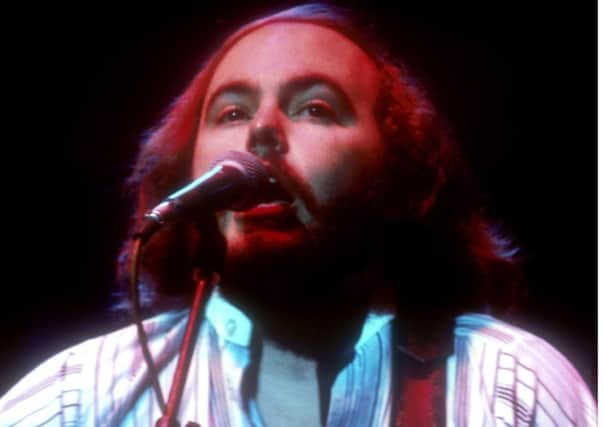Obituary: Iain Sutherland, singer/songwriter, founder of Sutherland Brothers


The Sutherland Brothers drew on their childhood in the North-East of Scotland to write two of the best-known songs of the 1970s, although it took a cover version by Rod Stewart to propel Sailing to No 1 in the charts and into the public consciousness, and Arms of Mary, the Sutherland Brothers’ biggest hit as recording artists was originally Hills of Gamrie, a reference to the hills near where they spent their early years.
Iain, who moved from Scotland to the Stoke area as a boy, was feeling nostalgic when he wrote “Oh, how I wish I was walking in the Hills of Gamrie”. But he and his younger brother Gavin agreed “Oh, how I wish I was lying in the Arms of Mary” might be a tad more universal in its appeal. There was no actual Mary. The song reached No 5 in the UK, No 1 in Ireland, the Netherlands and Belgium and, like Sailing, was covered by several other singers.
Advertisement
Hide AdAdvertisement
Hide AdWhen they were children, Iain and Gavin would learn chords and harmonies by listening to Everly Brothers records over and over again and then trying to copy them. Years later they heard a version of Arms of Mary on which the Everly Brothers replicated the Sutherland Brothers’ own arrangement. A continent and several decades away, the legendary American duo had repaid the debt.
Iain George Sutherland was born in Ellon maternity hospital in Aberdeenshire in 1948 and spent his earliest years in Peterhead. His father George was a civil servant who also played fiddle in his own band, everything from Glenn Miller to reels and strathspeys. Iain’s mother Eileen sang. The family moved to Blythe Bridge, near Stoke, because of George’s work. Iain and Gavin learned guitar at an early age and Iain had his own band called The Mysteries while still at school.
Initially school was quite challenging for the boys, whose accent and dialect were “full-on Peterheid”. Nevertheless Iain got a place at Manchester University and might have gone on to become an architect, but he decided instead to try to make a living with his band.
In the early 1960s the brothers moved to London, which was essentially the location of the British music industry at that time, sharing a room in a flat in West Kensington. They were always close. And although he was the quieter of the two, Iain was always protective and supportive of his younger sibling.
They saw themselves primarily as songwriters, rather than singers, but secured a deal with Island Records and in 1971 they released their first album entitled Sutherland Brothers Band.
Sailing was their third single, a quite different take from that of Rod Stewart. Although it was influenced by their background in the fishing communities of the North-East, it was really about the spiritual journey through life, rather than a physical journey. It was also influenced by their familiarity with the Kirk and hymns.
They linked up with the band Quiver at the end of 1972 and began to build a discerning audience with their melodic blend of folk, rock and pop. In May 1973 they were playing the Civic Centre in Motherwell, by September they were playing the Holywood Bowl and Madison Square Garden, New York, as support for Elton John. They found Elton courteous and professional, connecting over chat about football. He was a Watford fanatic, they followed Stoke City.
Sutherland Brothers and Quiver were probably more popular in the US than they ever were in the UK. They had a hit in North America in 1973 with (I Don’t Want to Love You But) You Got Me Anyway.
Advertisement
Hide AdAdvertisement
Hide AdThey wrote a couple of songs specifically for Rod Stewart and worked with him on demos with the intention that he would record one of them for his 1975 album Atlantic Crossing. It came as surprise to them when they discovered he had recorded Sailing. They did not even recognise it at first. It was only when he started singing that they recognised their song. No one knew then just how phenomenally successful it would become, selling over a million copies in the UK. It was credited to Gavin as writer, though he said he and Iain wrote it together.
In 1976 the Sutherland Brothers and Quiver headlined at the Glasgow Apollo and the Usher Hall in Edinburgh (£1 for the upper tier) and with the success of Arms of Mary they found themselves “graduating” from Old Grey Whistle Test to Top of the Pops.
Iain felt it was strangely anti-climactic. “You suddenly find yourself up there doing it in front of Noel Edmonds and a dozen little girls,” he said. “That’s all there is to it. And I thought, Wow, is this how the Beatles and all my heroes of the Sixties felt?”
The Sutherland Brothers released eight albums during the 1970s, six of them with Quiver, and had a few other minor hits before going on to solo careers in the 1980s. Iain had returned to the Stoke area, where he had his own music studio. “I just write and record for my own purposes and if anyone is interested, all well and good. The sort of stuff I write is difficult to categorise - maybe it’s folk, but it harks back to our Scottish roots.”
In recent years he lived in Wollerton in Shropshire. He is survived by his wife Patricia, their son James, author of the Norbert the Horse children’s books, daughter Virginia, and three grandchildren.
BRIAN PENDREIGH